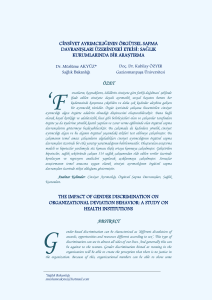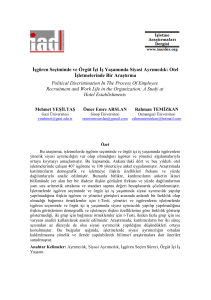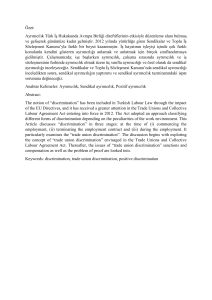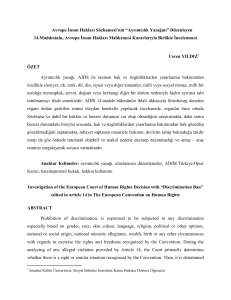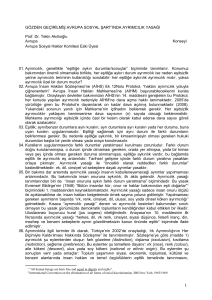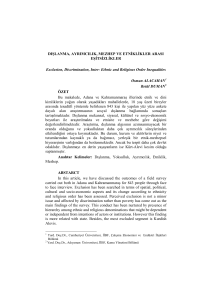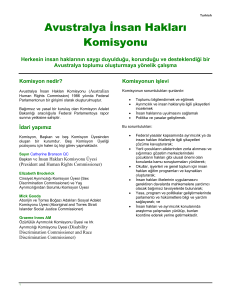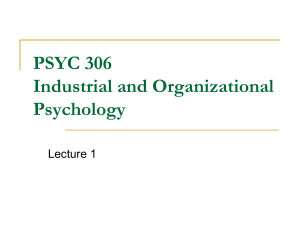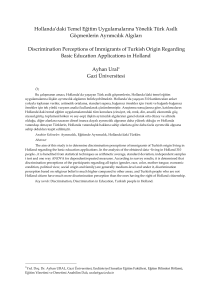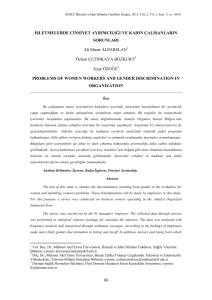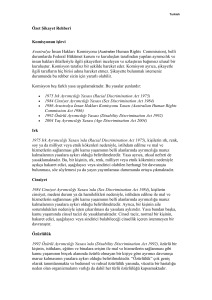Relationship between Political Discrimination Level Perceived by
advertisement
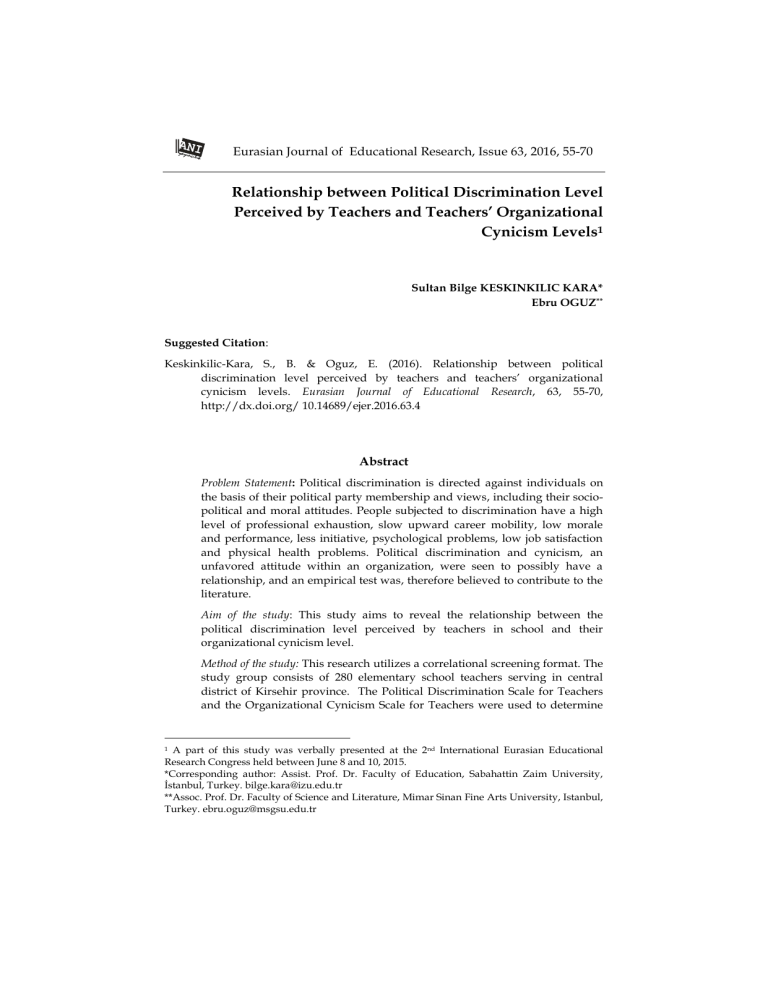
Eurasian Journal of Educational Research, Issue 63, 2016, 55-70 Relationship between Political Discrimination Level Perceived by Teachers and Teachers’ Organizational Cynicism Levels1 Sultan Bilge KESKINKILIC KARA* Ebru OGUZ** Suggested Citation: Keskinkilic-Kara, S., B. & Oguz, E. (2016). Relationship between political discrimination level perceived by teachers and teachers’ organizational cynicism levels. Eurasian Journal of Educational Research, 63, 55-70, http://dx.doi.org/ 10.14689/ejer.2016.63.4 Abstract Problem Statement: Political discrimination is directed against individuals on the basis of their political party membership and views, including their sociopolitical and moral attitudes. People subjected to discrimination have a high level of professional exhaustion, slow upward career mobility, low morale and performance, less initiative, psychological problems, low job satisfaction and physical health problems. Political discrimination and cynicism, an unfavored attitude within an organization, were seen to possibly have a relationship, and an empirical test was, therefore believed to contribute to the literature. Aim of the study: This study aims to reveal the relationship between the political discrimination level perceived by teachers in school and their organizational cynicism level. Method of the study: This research utilizes a correlational screening format. The study group consists of 280 elementary school teachers serving in central district of Kirsehir province. The Political Discrimination Scale for Teachers and the Organizational Cynicism Scale for Teachers were used to determine A part of this study was verbally presented at the 2nd International Eurasian Educational Research Congress held between June 8 and 10, 2015. *Corresponding author: Assist. Prof. Dr. Faculty of Education, Sabahattin Zaim University, İstanbul, Turkey. bilge.kara@izu.edu.tr **Assoc. Prof. Dr. Faculty of Science and Literature, Mimar Sinan Fine Arts University, Istanbul, Turkey. ebru.oguz@msgsu.edu.tr 1 56 Sultan Bilge Keskinkilic Kara & Ebru Oguz political discrimination levels perceived by teachers and their organizational cynicism level respectively. Results of the study: Findings of the research revealed a medium level of significant relationship between political discrimination perceived by teachers and their organizational cynicism. Additionally, discrimination in social relationships and discrimination in administrative affairs were found to affect organizational cynicism. Accordingly, discrimination in social relationships and administrative affairs was found to be a significant predictor of organizational cynicism. Conclusion and Recommendations: Results of the study demonstrate a relationship between political discrimination and organizational cynicism, and teachers’ perceptions of political discrimination play a significant role in promoting cynical behavior. The study recommends that to decrease teachers’ cynicism, school principals should assure that teachers are not experiencing political discrimination in school. Keywords: Organizational behavior, school administration, unethical behavior Introduction Unethical behavior refers to conflicts and behavioral problems within an organization which may be experienced from time to time. Depending on situations arising as a consequence of such behaviors, organizational culture and employee loyalty, performance and motivation weaken (Ozdevecioglu & Aksoy, 2005). Discrimination, also frequently seen in organizations, can be considered a type of unethical behavior. Discrimination is described as the victimization of a person because of a specific quality or as prevention of individual(s) in a society, organization, or group from making use of rights and opportunities granted to others (Ataov, 1996: as cited by Demir, 2011). Another description is that discrimination is a cultural/political attitude that turns any type of difference or otherness relationships into a power relationship and a hierarchy issue (Somay, 2012). Elements suggested as the cause of discrimination are observed sometimes as inborn qualities such as gender, age, race, color, etc. and sometimes as acquired qualities such as language, religion, marital status, political views, etc. Some inborn or acquired physical conditions or disabilities, however, are also considered within the scope of discrimination. Political discrimination is used to define unethical behaviors faced due to personal political views. International Labor Organization (ILO) (2006) defined political discrimination as discrimination against individuals on the basis of their political party membership and views, including their socio-political and moral attitudes. However, discriminatory behaviors also manifest itself as favoritism toward people who share the same political views. Individuals who are politically discriminated Eurasian Journal of Educational Research 57 against may be deprived of rights granted to fellow employees for prejudicial reasons. While any type of discrimination is prohibited by a series of laws at the national and international level, it is a phenomenon experienced by employees in organizations. It has been found that individuals who believe they are discriminated against in their employing organization have lower professional satisfaction, organizational dedication, psychological well-being and commitment than those who believe that they are not discriminated against. It has also been found that people subjected to discrimination have a high level of professional exhaustion, slow upward career mobility, low morale and performance, less initiative (Fernandez, Silvan-Ferrero, Molero, Gaviria & Garcia-Ael, 2015; Demir, 2012; Leasher & Miller, 2012; Esty, Griffin & Hirsch, 1995; Gallinsky, Bond & Friedman, 1993), psychological problems, low job satisfaction (Cassidy, Howe, Warden & O’Connor, 2004) and physical health problems (Mays, Cochran & Barns, 2007). Treating individuals at equal levels differently reduces their productivity and weakens the organization’s strength of sustainability, and from an ethical point of view, contradicts fairness criteria (Fritzsche, 1997; Yamak & Topbas, 2004; Demirel, 2011). Also, employees may not prefer organizations in which discriminatory behavior is displayed and be more inclined to quit their jobs. Furthermore, an organization’s image may be damaged. When the literature is investigated, different types of discrimination are seen. Discrimination may be based on gender, social gender roles (Bora, 2012), age (Baybora, 2010; Buz, 2015; Cayir, 2012), race, religion, ethnic origin, disability, education level, socio-economic status, homosexuality and political views (Demir, 2011; Cayir & Ayan-Ceyhan, 2012). An investigation of the research conducted in educational institutions reveals that gender discrimination receives the greatest attention (Bastug & Celik, 2011; Gonel, Kaplan, Ucer & Orhan, 2012; Esen, 2013). Only a limited number of studies focus on political discrimination (Keskinkilic-Kara, 2015). Research shows that political discrimination experienced in organizations affects employee behavior as well as the organization’s efficiency. Political discrimination and cynicism, an unfavored attitude within an organization, were seen to possibly have a relationship, and an empirical test was, therefore, believed to contribute to the literature. Cynicism A cynic is defined as a person who believes that people only care about their selfinterests and, therefore, considers everyone selfish; the school of thought describing this attitude is called “cynicism”(Erdost, Karacaoglu & Reyhanoglu, 2007). Cynicism can be defined as a negative attitude having cognitive, affective and behavioral components. In other words, it is a “dislike and distrust of others” (Brandes, Dharwadkar & Dean, 1999). Organizational cynicism is a belief in unfairness, and distrust of an organization and. It is a complex attitude involving cognitive, affective and behavioral aspects resulting in beliefs arising from actions based on such beliefs and distrust (Johnson & O’Leary- Kelly, 2003). The feeling that organizational 58 Sultan Bilge Keskinkilic Kara & Ebru Oguz cynicism lacks honesty reflects the cognitive dimension. In cognitive dimension, cynical people are seen to lack organizational principles and rules, not take official affairs and rules seriously; demonstrate inconsistent, untruthful and deceitful behaviors; have difficulty trusting others, and value their self-interests above everything else (Brandes, 1997; Dean, Brandes & Dharwadkar, 1998). Affective dimension subsumes powerful and negative emotional reactions against organizations such as disrespect, anger, agitation and embarrassment (Abraham, 2000). Behavioral dimension, on the other hand, subsumes pessimistic forecasts about future events in organization and elements, such as irony, contempt, and critical expressions against organization (Ozgener, Ogut & Kaplan; 2008; Kutanis & Cetinel, 2009; Ozgan, Cetin, Kulekci, 2012; Yildiz, 2013). Eaton (2000) indicated that the organizational cynicism consists of the belief that an organization lacks integrity, negative effects toward the organization are present, and disparaging and critical behaviors are displayed. The fundamental ideas in the organizational cynicism concept is a lack of honesty, integrity, justice, sincerity and cordiality. Within an organization, leaders or other employees pursue their self-interests, thus causing behaviors based on secret motives and deceit (Abraham, 2000). Types of organizational cynicism are personality, social, employee, organizational change and occupational/professional cynicism (as cited by: Pelit & Pelit, 2014). Personality cynicism is defined as the general perception of human behaviors as negative. While social cynicism is a lack of trust of people in a country toward their government and public organizations, employee cynicism generally targets organizations, senior management, and other entities in the work environment. Organizational change cynicism refers to a pessimistic view of a change carried out in an organization to achieve success. Lastly, occupational/professional cynicism is described as negative and distrustful attitudes toward authority and organizations. Cynicism is experienced in both private and public organizations. Cynicism in public organizations is primarily a result of the bureaucratic organizational structure (Albrecht, 2002: as cited by Kalagan & Guzeller, 2009). Cynical employees have an important role in determining the underlying causes of organizational problems, and therefore, contribute significantly to the efforts exerted toward organizational change (Bommer et al., 2005; as cited by Kalagan & Guzeller, 2009). Any type of discrimination applied in organizations may result in organizational cynicism. The present study aims to determine whether or not there is a significant relationship between political discrimination perceived by teachers and their organizational cynical behaviors. For this purpose, answers to the following questions were sought: 1. Is there a significant relationship between the level of political discrimination perceived by teachers and organizational cynicism? 2. To what the extent does the level of political discrimination perceived by teachers predict organizational cynicism? There is some research on organizational cynicism, but research on political discrimination and its effects is limited and the relationship between political Eurasian Journal of Educational Research 59 discrimination and organizational cynicism has not been studied in the current literature. It is expected that the findings of this study will provide empirical evidence for explaining the political discrimination and organizational cynicism and will help principals to understand the effects of political discrimination. Also this study will benefit the teachers, as managing without any discrimination is a duty of each principal. Methodology Research Design This research is a descriptive study conducted with a relational screening model. “Relational screening models are research models that aim to determine the covariance between two or more variables and/or determine its extent.” (Karasar, 2009, 81). Research Sample The study group included 280 teachers selected based on the simple random sampling method from the elementary schools in central district of Kirsehir in Turkey. Of the participants, 52.1% were female and 47.9% were male. Of the participants, 41.4% had 1-5 years of service, 23.2% had 6-10 years of service, 22.9% had 11-15 years of service, 8.9% had 16-20 years of service and 3.5% had 21 or more years of service. Undergraduate degrees were reported by 93.9% of the respondents, while 5.4% had a graduate degree and 7% had an associate degree. Research Instrument and Procedure Two different scales were used to collect data in the study. The Political Discrimination Scale for Teachers (PDST) developed by Keskinkilic-Kara and Buyukoksuz (2013) was used to determine the political discrimination level perceived by teachers. The PDST is comprised of 28 items. It is a 5-point Likert-type scale comprising two dimensions, discrimination in social relations and discrimination in administrative affairs. The Cronbach Alpha coefficient for the entire scale is .97. The Cronbach Alpha coefficients of the PDST sub-dimensions are .98 for the sub-dimension of discrimination in social relations and .84 for the subdimension of discrimination in administrative affairs. The Organizational Cynicism Scale (OCS) developed by Sagir and Oguz (2012) was used to determine teachers’ organizational cynicism level. OCS is a 5-point Likert-type scale consisting of 25 items and 4 dimensions. Cronbach Alpha coefficients of the sub-dimensions of the scale are .86 for the sub-dimension of alienation from employing organization, .88 for the sub-dimension of factors decreasing performance, .85 for negative attitudes toward school and .68 for the subdimension of employee participation in decisions and applications; it is .89 for the entire scale. 60 Sultan Bilge Keskinkilic Kara & Ebru Oguz Data Analysis The statistical analysis of the data collected in the study was performed using The Statistical Package Program for Social Sciences. When the normality of the data set was examined, it was found to have a parametric distribution (p >. 05). During the data analysis, Pearson correlation analysis was used to determine the relationship between political discrimination and organizational cynicism, and regression analyses was used to determine the relationship between dependent and independent variables. Result The correlation analysis results are presented in Table 1. An absolute value of correlation coefficient suggests a high level of relation if it is between 0.70-1.00; a medium level of relationship if it is between 0.70- 0.30; and a low level of relationship if it is between 0.30-0.00 (Buyukozturk, 2009). According to the correlation analysis result in Table 1, there is a medium level of significant relationship between political discrimination perception and organizational cynicism of perception. A medium level of significant positive relationship was found between teachers’ political discrimination perceptions and the sub-dimensions of organizational cynicism, alienation from employing organization (r=.396; p<.01), factors decreasing performance (r=.541; p<.01) and negative attitudes toward school (r=.307; p<.01). A medium level of significant positive relationship was found between the subdimension of discrimination in administrative affairs of political discrimination and the sub-dimensions of organizational cynicism, alienation from employing organization (r=.418; p<.01), factors decreasing performance (r=.568; p<.01) and negative attitudes toward school (r=.312; p<.01). A low level of significant negative relationship was found between the sub-dimension of discrimination in social relations and the sub-dimension of participation in decisions and applications of organizational cynicism (r=-.155; p<.01). Similarly, a low level of significant negative relationship was found between the sub-dimension of discrimination in administrative affairs of political discrimination and the sub-dimension of participation in decisions and applications of organizational cynicism (r=-.204; p<.01). Table 1. Correlation Analysis Results for the Relationship between Political Discrimination level Perceived by Teachers and Teachers’ Organizational Cynicism Level Variables 1 1. Discrimination in Social relations 2. Discrimination in Administrative Affairs 1 308* 2 1 3 4 5 6 7 8 Eurasian Journal of Educational Research 61 Table 1 Continue Variables 3. Discrimination 4.Alienation from Employing Organization 5. Factors Decreasing Performance 6. Negative Attitudes Toward School 7. Employee Participation in Decisions and Applications 8. Organizational Cynicism 1 2 478* .055 3 .983* .418* 4 1 .396* 5 6 7 8 1 .086 .568* .541* .617* 1 .101 .312* .307* .526* .483* 1 -.155* -.204* -.218* -.205* -.102 -.209* 1 .060 .516* .488* .820* .904* .667* .033 *p<.01 The regression analysis results is presented in Table 2. Table 2. Regression Analysis Results for Prediction of Organizational Cynicism Variable B Discrimination in Social Relations -0,331 Discrimination in Administrative Affairs R=0.52, R2=0.27, p<.05 Standard Error 0.349 Β t Pp 0.162 -0.110 -2.042 .000 0.034 0.550 10.248 .042 1 62 Sultan Bilge Keskinkilic Kara & Ebru Oguz As a result of the regression analysis conducted to reveal to what extent discrimination in social relations and discrimination in administrative affairs are believed to affect organizational cynicism predict organizational cynicism, these two variables were found to affect organizational cynicism (R²=0.27). Discrimination in social relations and discrimination in administrative affairs combined explain 27% of organizational cynicism (Figure 1). According to standardized regression coefficients, relative order of importance of predictor variables in respect of organizational cynicism is discrimination in administrative affairs (β=0.550) and discrimination in social relations (β=.-0.110). In view of the significance tests of the regression coefficients, the predictor variable of discrimination in social relations is a significant predictor of organizational trust at (p<0.01) level, and that of discrimination in administrative affairs is at a (p<0.05) level. Discrimination in %0.4 Social Relations -0.33 Organizational Cynicism Discrimination in % 27 Administrative 0.35 Affairs Figure 1. Statistical model Discussion Conclusion and Recommendations This research sought to determine the level of the relationship between political discrimination perceived by teachers and cynical behavior in organizations. According to the research data, there is a medium level of significant relationship between political discrimination perceived by teachers and their organizational cynicism. When sub-dimensions are examined, a medium level of significant positive relationship was found between political dimension perceived by teachers and the sub-dimensions of organizational cynicism, alienation from employing organization, factors decreasing performance, and negative attitudes toward school. A medium level of significant positive relationship was found between the subdimension of discrimination in administrative affairs of political discrimination and the sub-dimensions of organizational cynicism, alienation from employing organization, factors decreasing performance and negative attitudes toward school. A low level of significant negative relationship was found between the subdimension of discrimination in social relationships of political discrimination and the sub-dimension of participation in decisions and applications of organizational cynicism. Given such findings, it may be suggested that displays of discrimination in Eurasian Journal of Educational Research 63 social relationships decrease teachers’ organizational cynicism level, albeit slightly. Similarly, a low level of significant negative relationship was found between the subdimension of discrimination in administrative affairs of political discrimination and the sub-dimension of participation in decisions and applications of organizational cynicism. Also, discrimination in social relationships and discrimination in administrative affairs were found to affect organizational cynicism. Discrimination in social relationships and discrimination in administrative affairs together explain 27% of organizational cynicism and relative order of importance of predictor variables in respect to organizational cynicism is discrimination in administrative affairs and discrimination in social relationships. According to this, discrimination in social relationships and administrative affairs was found to be a significant predictors of organizational cynicism. This research result is congruent with the expectations, and teachers’ cynical behaviors increase as political discrimination increases because any type of unfair and unethical behavior tends to decrease the cynicism level. When the literature is examined, no research was found directly focusing on political discrimination and the relationship between discrimination and cynicism. However, any type of discrimination is an ethical problem. Research conducted by Khan (2007) revealed that a lack of ethical behaviors leads to cynicism, and those findings are consistent with this research. Similarly, the findings of the research revealing that injustice and intimidation experienced in organizations increase employees’ cynical behaviors (Kutanis & Cetinel, 2009; Guzel & Ayazlar, 2014; Gul & Agiroz, 2011; Pelit & Pelit, 2014) are also consistent with those of this research. A way of preventing cynical behaviors among teachers in educational institutions may be through an effective school administration that does not allow discrimination, values diversity, and is based on fair and ethical behavior. The duty of preventing any type of discrimination and its possible negative effects in educational organizations rests with policymakers and scientists. Another way of ensuring organizational justice and preventing discrimination is through cooperation of the Ministry of National Education. The academic institution should impose ethical standards as required qualifications for school administrators. An equal distance kept by school administrators and teachers to all in school will also have a positive impact on the school climate. Harmony among school administrators and teachers would eliminate negative feelings toward school. The most important limitation of the present study determining the relationship between political discrimination and organizational cynicism is that it was conducted only in Kirsehir province. It is recommended that future research conducted in are include a larger sample and focus on determining the relationship between cynicism and political discrimination in respect to organization factors such as organizational support, organizational policies and organizational covenant violations, organizational silence, and organizational trust. Also, causes, consequences, and effects of discrimination and cynicism can be investigated in detail using different tools. This study recommends that to decrease the teachers’ cynical behaviors school principals should assure that teachers are not experiencing political discrimination in school. 64 Sultan Bilge Keskinkilic Kara & Ebru Oguz References Abraham, R. (2000). Organizational cynicism: Bases and consequences. Genetic, Social, and General Psychology Monographs, 126(3), 269-292. Bastug, O. Y. O., & Celik, B. (2011). Ilkogretimde ogretmen, mudur ve mufettislerin kadın yoneticilere yonelik tutumları [Attitudes of teachers, principals and supervisors towards woman administrators in primary schools]. Kuram ve Uygulamada Egitim Yonetimi Dergisi, 17(1), 63-76. Baybora, D. (2010). Calisma yasaminda yas ayrimciligi ve Amerika Birleşik Devletleri’nde yas ayrimciligi duzenlemesi uzerine [Working life ageism and age discrimination in the United States on regulation]. Calısma ve Toplum, 1. Brandes, P. (1997). Organizational cynicism: Its nature, antecedents and consequences. (Unpublished Doctoral Thesis). Cincinnati University. Brandes, P. Dharwadkar, R., & Dean, J. W. (1999). Does organizational cynicism matter? Employee and supervisor perspectives on work outcomes. Eastern Academy of Management Proceedings, 150–153. Bora, A. (2012). Toplumsal cinsiyete dayali ayrimcilik [Gender-based discrimination]. K. Cayir & M. Ayan Ceyhan (Edit.) Ayrimcilik, cok boyutlu yaklasimlar. Istanbul Bilgi Universitesi Yayinlari 393. Buyukozturk, S. (2009). Sosyal bilimler icin veri analizi el kitabı istatistik, araştirma deseni SPSS uygulamalari ve yorum. Ankara: Pegem Yayinevi. Buz, S. (2015). Yasli bireylere yonelik yas ayrimciligi [Age discrimination against elderly persons]. Elektronik Sosyal Bilimler Dergisi, 14(53), 268-278. Cassidy, C., Howe, C., Warden, D. & O’Conner, R. C. (2004). Perceived discrimination and psychological distress: The role of personal and ethnic selfesteem. Journal of Counselling Psychology, 51(3), 329-339. Cayir, K. (2012). Yascilik/yasa dayali ayrimcilik [Age-based discrimination]. K. Cayir & M. Ayan Ceyhan (Edit.), Ayrimcilik, cok boyutlu yaklasimlar. Istanbul Bilgi Universitesi Yayınları 393. Dean Jr, J.W. Brandes, P., & Dharwadkar, R. (1998). Organizational cynicism. The Academy of Management Review, 2(23), 341-352. Demir, M. (2011). Is yasaminda siyasi ayrimcilik: Turizm sektoru ornegi. [Discrimination in the working life: A sample of tourism sector]. Uluslar arası İnsan Bilimleri Dergisi, 8(1), 760-784. Demirel, Y. (2011). Is yerinde ayrimcilik: Kavramsal bir inceleme [Discrimination in the workplace: A conceptual review]. TISK Akademi, 2, 66-87. Eurasian Journal of Educational Research 65 Eaton, J.A. (2000). A social motivation approach to organizational cynicism. (Dissertation of Master of Arts). Faculty of Graduate Studies. York University, Toronto. Erdost, Karacaoglu, Reyhanoglu, (2007). Organizational cynism and testing related scales in a firm in Turkey. 15th National Management and Organization Congress, Sakarya University, Sakarya. Esen, Y. (2013). Gender discrimination in educational processes: an analysis on the experiences of studentship. International Online Journal of Educational Sciences, 5(3), 757-782. Esty, K., Griffin, R., & Hirsch, M. S., (1995). Workplace diversity: A manager’s guide to solving problems and turning diversity into a competetive advantage. Massachusetts: Adams Media Corporation. Fernandez, I., Silvan-Ferrero, P., Molero, F., Gaviria, E., & Garcia-Ael, C. (2015). Perceived discrimination and well-being in Romanian immigrants: The role of social support. Journal of Happiness Studies, 16(4), 857-870. Fritzsche, D., J. (1997). Business ethics a global and managerial perspective. Pennsylvania State University, Great Valley Graduate Center. McGraw-Hill Series in Management. Galinsky, E., Bond, J., Friedman, D. (1993). Highlights: The national study of the changing workforce. New York: Families and Work Institute. Gonel, F., Kaplan, Z., Uçer, E., & Orhan, G. (2012). Universite egitiminde cinsiyet ayrimciliginin kokenleri (YTU ornegi). [The origins of gender discrimination in university education]. Sosyal ve Beseri Bilimler Dergisi, 4(2), 111-120. Gul, H., & Agıroz, A. (2011). Mobbing ve orgutsel sinizm arasindaki iliskiler: Hemsireler uzerinde bir uygulama [Relations between mobbing and organizational cynicism: An application on nurses]. Iktisadi ve Idari Bilimler Fakultesi Dergisi, 13(2), 27-47. Guzel, B. & Ayazlar, G. (2014). Orgutsel adaletin orgutsel sinizm ve isten ayrilma niyetine etkisi: Otel isletmeleri arastirmasi [The effect of organizational justice towards organizational cynicism and job quit intentions: a research on hotels]. KMU Sosyal ve Ekonomik Arastirmalar Dergı̇si, 16(26), 133-142 ILO (2006). Eliminating discrimination in the workplace. Retrieved January 19, 2014, from http://www.ilo.org/wcmsp5/groups/public/---ed_emp/---emp_ent/multi/documents/publication/wcms_116342.pdf. Johnson, J. L., & O’Leary-Kelly, A. (2003). The effect of psychological contract breach and organizational cynicism: Not all social exchange violations are created equal. Journal of Organizational Behavior, 24, 627–647. 66 Sultan Bilge Keskinkilic Kara & Ebru Oguz Kalagan, G. & Guzeller, C.O. (2010). Ogretmenlerin sinizm duzeylerinin incelenmesi [The organizational cynicism levels of the teachers]. Pamukkale Universitesi Egitim Fakultesi Dergisi, 27, 83-97 Karasar, N. (2009). Bilimsel arastirma yontemi. Ankara: Nobel Yayin Dagitim. Keskinkilic-Kara, S. B. & Buyukoksuz, T. (2013). Ogretmenler için siyasi ayrimcilik olceginin gelistirilmesi calismasi [Improving the operation of political discrimination scale for teachers]. IZU Sosyal Bilimler Dergisi, 5. Keskinkilic-Kara, S. B. (2015). Relationship between political discrimination and dissent behaviour displayed by teachers. Educational Research and Reviews, 10(7), 933-940. Khan, H. (2006). Deterring cynicism to regain American competitiveness. Competition Forum, 4(1), 48-54. Kutanis, R. O, & Cetinel, E. (2009). Adaletsizlik algisi sinizmi etkiler mi? Bir ornek olay. 17. Yonetim ve Organizasyon Kongresi Kongre Kitabi. Osmangazi Universitesi, Eskisehir. 693-699. Leasher, M. K., & Miller, C. E. (2012). Discrimination across the sectors: A comparison of discrimination trends in private and public organizations. Public Personnel Management, 41(2), 281-325. Mays, V., Coleman, L., & Jackson, J. (1996). Perceived race-based discrimination, employment status, and job stress in a national sample of Black women: Implications for health outcomes. Journal of Occupational Health Psychology, 1(3), 319-329. Somay, B. (2012). Ayirarak birlestirmek mumkun mudur?. K. Cayır & M. Ayan Ceyhan (Edit). Ayrimcilik, cok boyutlu yaklasimlar [Multi-dimensional approaches of discrimination]. Istanbul Bilgi Universitesi Yayinlari 393. Ozdevecioglu, M. & Aksoy, M. S. (2005).Organizasyonlarda sabotaj: Turleri, amaçlari, hedefleri ve yonetimi [Sabotage in organizations: Types, goals, targets and management of sabotage]. Cumhuriyet Universitesi Iktisadi ve Idari Bilimler Dergisi, 6(1), 95-109. Ozgan, H., Cetin & B. Kulekci, E. (2012). Ilkogretim kademesinde gorev yapan ogretmenlerin orgutsel sinizm duzeyinin bazi degiskenler acisindan incelenmesi [Observing primary education grade teachers organizational cynicism levels according to the some specific variables]. Sosyal Bilimler Arastirma Dergisi, 17, 69- 84. Eurasian Journal of Educational Research 67 Ozgener, S., Ogut, A. & Kaplan, M. (2008). Isgoren-isveren iliskilerinde yeni bir paradigma: Orgutsel sinizm. In M. Ozdevecioğlu & H. Karadal (Edit). Orgutsel davranista secme konular: Organizasyonlarin karanlik yonleri ve verimlilik azaltici davranislar [Selecting topics in organizational behavior: Dark side and efficiency reducing behavior in the organization]. Ankara: Ilke Yayinevi. Pelit, E., & Pelit, N. (2014). Mobbing ve orgutsel sinizm [Mobbing and organizational cynicism]. Detay Yayincilik. Pelit, E., & Pelit, N. (2014). The effects of mobbing on organizational cynicism: A study on hotels in Turkey. International Journal of Human Resource Studies, 4(1), 34. Sagir, T., & Oguz, E. (2012). Ogretmenlere yonelik orgutsel sinizm olceginin gelistirilmesi [Developing of organizational cynicism scala for teachers]. Journal of Human Sciences, 2, 1094-1106. Yamak, N., & Topbas, F. (2004). Kadin emegi ve cinsiyete dayali ucret ayrimciligi [Women's labor and gender-based wage discrimination]. Iktisadi ve Idari Bilimler Dergisi, 18(3-4), 144-156. Yildiz, K. (2013). Orgutsel baglilik ile orgutsel sinizm ve orgutsel muhalefet arasindaki iliski [The relationship between organizational commitment and organizational cynicism and organizational dissent]. Turkish Studies International Periodical for The Languages, Literature and History of Turkish or Turkic, 8(6), 853-879. Öğretmenlerin Algıladıkları Siyasi Ayrımcılık İle Örgütsel Sinizm Düzeyleri Arasındaki İlişki Atıf: Keskinkilic-Kara, S., B. & Oguz, E. (2016). Relationship between political discrimination level perceived by teachers and teachers’ organizational cynicism levels. Eurasian Journal of Educational Research, 63, 55-70, http://dx.doi.org/ 10.14689/ejer.2016.63.4 Özet Problem Durumu: Siyasi ayrımcılık kişilerin siyasi görüşleri nedeniyle karşılaştıkları etik olmayan davranışları tanımlamak için kullanılmaktadır. Uluslararası Çalışma Örgütü (ILO) (2006) siyasi ayrımcılığı, bireylerin siyasi parti üyelikleri ve siyasi, sosyo-politik ve ahlaki tutumları da dahil, düşüncelerine karşı yapılan ayrımcılık olarak tanımlamıştır. Ancak, ayrımcı davranışlar kimi zaman aynı siyasi görüşe sahip kişileri kayırma şeklinde de olabilmektedir. Siyasi ayrımcılığa maruz kalan bireyler önyargılardan kaynaklanan nedenlerde diğer işgörenlerin yararlandığı haklardan mahrum kalabilmektedirler. Çalıştıkları kurumda ayrımcılığa 68 Sultan Bilge Keskinkilic Kara & Ebru Oguz uğradıklarını düşünen bireylerin mesleki doyumlarının, örgütsel adanma ve bağlılık düzeylerinin ayrımcılığa uğramadığını düşünen bireylere göre daha düşük olduğu belirlenmiştir. Ayrıca, ayrımcılığa uğrayan bireylerin mesleki tükenmişlik düzeylerinin yüksek olduğu, kariyer ilerlemelerinin yavaş olduğu, morallerinin ve performanslarının düşük olduğu, daha az inisiyatif aldıkları (Gallinsky, Bond ve Friedman, 1993; Leasher ve Miller, 2012; Demir, 2011; Esty, Griffin ve Hirsch, 1995) psikolojik sorunlar yaşadıkları, iş tatminlerinin düşük olduğu (Cassidy, Howe, Warden ve O’Connor, 2004) ve fiziksel sağlık sorunları yaşadıkları belirlenmiştir (Mays, Cochran ve Barnes, 2007). Ayrımcı davranışların sergilendiği örgütleri işgörenler çalışmak için tercih etmeyebilir, çalışanların işten ayrılma niyetleri artabilir ve örgütün imajı hasar görebilir. Eğitim örgütlerinde yaşanan siyasi ayrımcılığın çalışanların davranışlarını ve örgütün verimini etkilediğini araştırmalar göstermektedir. Öğretmenler tarafından algılanan siyasi ayrımcılık ile örgüt içinde istenmeyen bir tavır olan sinizmin ilişkili olabileceği görülmüş ve ampirik olarak test edilmesinin alanyazına katkı sağlayacağı düşünülmüştür. Bireylerin yalnız kendi çıkarlarını gözettiğine inanan ve buna göre herkesi çıkarcı kabul eden kimse olarak açıklanan ‘sinik’ ve bunu açıklamaya çalışan düşünceye de ‘sinizm’ denmektedir (Erdost, Karacaoğlu, Reyhanoğlu, 2007). Sinizm “diğerlerinden hoşlanmama ve diğerlerine güvenmeme” olarak tanımlanmaktadır (Brandes, Dharwadkar ve Dean, 1999). Örgütsel sinizm, örgütün adil olmadığına dair inanç, güvenmeme ve buna bağlı eylemlerin artmasıyla oluşan inanışlarla sonuçlanan bilişsel, duyuşsal ve davranışsal açıları kapsayan karışık bir tutumdur (Johnson ve O’Leary- Kelly, 2003). Sinik işgörenlerin, örgütsel problemlerin temelindeki nedenleri belirlemede önemli rolleri vardır. Dolayısıyla, örgütsel değişim için gerçekleşen çabalara büyük katkı sağlarlar (Bommer ve diğerleri, 2005; akt. Kalağan ve Güzeller, 2009). Bu nedenle örgütlerde uygulanan her türlü ayrımcılık örgütsel sinizmin nedeni olabilir. Araştırmanın Amacı: Bu araştırmanın amacı, öğretmenlerin algıladıkları siyasi ayrımcılık ile örgütsel sinizm davranışları arasında anlamlı bir ilişki olup olmadığını belirlemektir. Bu amaçla, “öğretmenlerin algıladıkları siyasi ayrımcılık düzeyi ile örgütsel sinizmin arasında anlamlı bir ilişki var mıdır?” ve “öğretmenlerin algıladıkları siyasi ayrımcılık düzeyi örgütsel sinizmin ne kadarını yordamaktadır ?”sorularına yanıt aranmıştır. Araştırmanın Yöntemi: Araştırma ilişkisel tarama türünde desenlenmiştir. Araştırmaya Kırşehir ili merkez ilçede görev yapan 280 ilköğretim okulu öğretmeni katılmıştır. Veri toplama aracı olarak iki farklı ölçek kullanılmıştır. Öğretmenlerin algıladıkları siyasi ayrımcılık düzeyini belirlemek için Keskinkilic-Kara ve Büyüköksüz (2013) tarafından geliştirilmiş olan “Öğretmenler İçin Siyasi Ayrımcılık Ölçeği” kullanılmıştır. Öğretmenlerin örgütsel sinizm düzeyini belirlemek için ise Sağır ve Oğuz (2012) tarafından geliştirilmiş olan “Örgütsel Sinizm Ölçeği” kullanılmıştır. Veriler çözümlenirken bağımlı ve bağımsız değişkenler arasındaki ilişkiyi belirlemek için korelasyon ve regresyon analizinden yararlanılmıştır. Eurasian Journal of Educational Research 69 Araştırmanın Bulguları: Analizi sonuçlarına göre öğretmenlerin algıladıkları siyasi ayrımcılık ile örgütsel sinizm arasında orta düzeyde anlamlı bir ilişki olduğu belirlenmiştir (r=.488; p<.01). Öğretmenlerin algıladıkları siyasi ayrımcılık ile örgütsel sinizmin alt boyutları olan çalıştığı kurumdan uzaklaşma (r=.396; p<.01), performansı düşüren etkenler (r=.541; p<.01) ve okula karşı olumsuz tutumlar (r=.307; p<.01) arasında pozitif yönde orta düzeyde anlamlı bir ilişki bulunmuştur. Siyasi ayrımcılığın yönetsel işlerde ayrımcılık alt boyutu ile örgütsel sinizmin çalıştığı kurumdan uzaklaşma (r=.418; p<.01), performansı düşüren etkenler (r=.568; p<.01) ve okula karşı olumsuz tutum (r=.312; p<.01) arasında pozitif yönde orta düzeyde anlamlı bir ilişki belirlenmiştir. Siyasi ayrımcılığın sosyal işlerde ayrımcılık alt boyutu ile örgütsel sinizmin çalışanların karara ve uygulamalara katılımı (r=-.155; p<.01) alt boyutu arasında negatif yönde düşük düzeyde anlamlı bir ilişki bulunmuştur. Benzer şekilde siyasi ayrımcılığın yönetsel işlerde ayrımcılık alt boyutu ile çalışanların kararlara ve uygulamalara katılımı (r=-.204; p<.01) alt boyutu arasında negatif yönde düşük düzeyde anlamlı bir ilişki belirlenmiştir. Örgütsel sinizm üzerinde etkisi olduğu düşünülen sosyal işlerde ayrımcılık ve yönetsel işlerde ayrımcılığın örgütsel sinizmi ne düzeyde yordadığını ortaya koymaya yönelik olarak yapılan regresyon analizi sonucunda, bu iki değişkenin örgütsel sinizm üzerinde etkisi olduğu belirlenmiştir (R²=0.27). Sosyal işlerde ayrımcılık ve yönetsel işlerde ayrımcılık birlikte örgütsel sinizmin %27’sini açıklamaktadır (Şekil 1). Standartlaştırılmış regresyon katsayılarına göre, yordayıcı değişkenlerin, örgütsel sinizm üzerindeki göreli önem sırası yönetsel işlerde ayrımcılık (β=0.550) ve sosyal işlerde ayrımcılıktır (β=.-0.110). Regresyon katsayılarının anlamlılık testleri göz önüne alındığında, yordayıcı değişkenlerden sosyal işlerde ayrımcılık değişkeninin (p<0.01) düzeyinde, yönetsel işlerde ayrımcılık değişkeninin (p<0.05) düzeyinde örgütsel güven üzerinde anlamlı yordayıcı olduğu görülmektedir. Araştırmanın Sonuç ve Önerileri: Araştırma bulgularına göre öğretmenlerin algıladıkları siyasi ayrımcılık ile örgütsel sinizm arasında orta düzeyde anlamlı bir ilişki bulunmuştur. Alt boyutlara bakıldığında ise, öğretmenlerin algıladıkları siyasi ayrımcılık ile örgütsel sinizmin alt boyutları olan çalıştığı kurumdan uzaklaşma, performansı düşüren etkenler ve okula karşı olumsuz tutumlar arasında pozitif yönde ve orta düzeyde anlamlı bir ilişki olduğu belirlenmiştir. Siyasi ayrımcılığın yönetsel işlerde ayrımcılık alt boyutu ile örgütsel sinizmin çalıştığı kurumdan uzaklaşma, performansı düşüren etkenler ve okula karşı olumsuz tutum arasında pozitif yönde orta düzeyde anlamlı bir ilişki belirlenmiştir. Siyasi ayrımcılığın sosyal ilişkilerde ayrımcılık alt boyutu ile örgütsel sinizmin çalışanların karara ve uygulamalara katılımı alt boyutu arasında negatif yönde düşük düzeyde anlamlı bir ilişki belirlenmiştir. Bu durumda sosyal ilişkilerde yapılan ayrımcılığın sergileniyor olması öğretmenlerin örgütsel sinizm düzeylerini düşük de olsa düşürüyor yorumu yapılabilir. Benzer şekilde siyasi ayrımcılığın yönetsel işlerde ayrımcılık alt boyutu ile çalışanların kararlara ve uygulamalara katılımı alt boyutu arasında negatif yönde düşük düzeyde anlamlı bir ilişki belirlenmiştir. Ayrıca, sosyal ilişkilerde ayrımcılık ve yönetsel işlerde ayrımcılığın örgütsel sinizm üzerinde etkisi olduğu belirlenmiştir. Sosyal ilişkilerde ayrımcılık ve yönetsel işlerde ayrımcılık birlikte örgütsel sinizmin %27’sini açıklamaktadır ve yordayıcı değişkenlerin, örgütsel sinizm üzerindeki göreli 70 Sultan Bilge Keskinkilic Kara & Ebru Oguz önem sırası yönetsel işlerde ayrımcılık ve sosyal ilişkilerde ayrımcılıktır. Buna göre, sosyal ilişkilerde ve yönetsel işlerde ayrımcılığın örgütsel sinizmin anlamlı bir yordayıcısı olduğu belirlenmiştir. Araştırmanın sonucu beklentilere uygun niteliktedir ve siyasi ayrımcılık arttıkça öğretmenlerin sinik davranışları artmaktadır çünkü her tür adil olmayan, etik dışı davranışın sinizm düzeyini artırma etkisi söz konusudur. Eğitim örgütlerinde öğretmenlerin sinik davranışlarını önlemenin bir yolu olarak ayrımcılığa yer vermeden, farklılıklara değer vererek, adil ve etik davranış temelinde bir okul yönetiminin etkili olabileceği görülmektedir. Anahtar Sözcükler: Örgütsel davranış, sinizm, okul yönetimi, etik dışı davranış.
